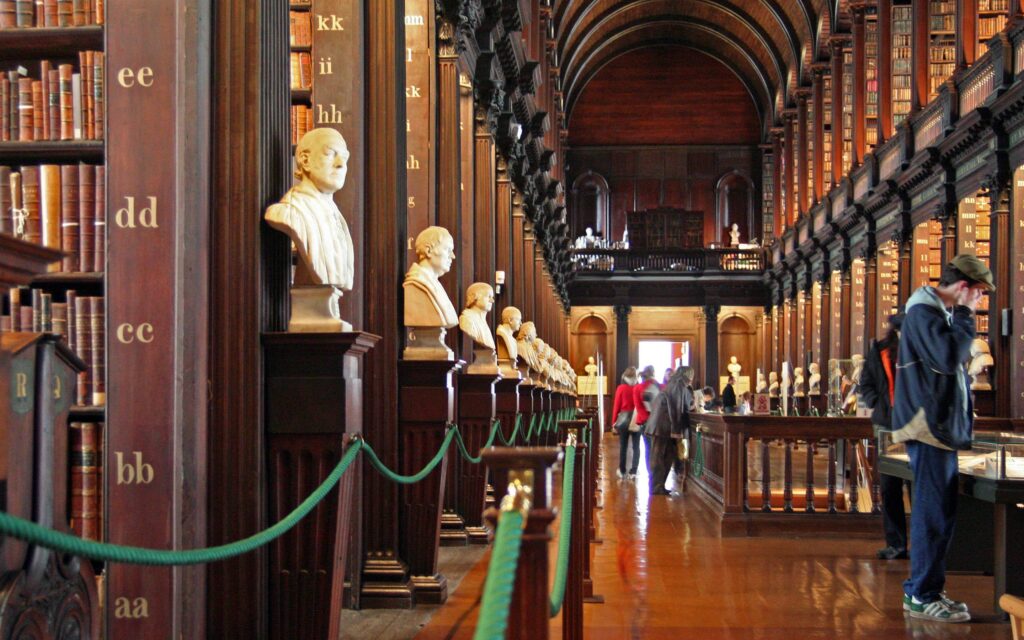The Trinity Long Room Hub is hosting Contemporary Irish History Seminar | Misjudging Charlie? on Wednesday, 26 January 2022, 4 – 5pm
Contemporary Irish History Seminar | Misjudging Charlie?
Register here.
A panel discussion to include Professor Gary Murphy (Dublin City University), Dr Deirdre Foley (University of Oxford), Dr Liam Weeks (University College Cork) as part of the Trinity Centre for Contemporary Irish History Research Seminar Series in association with the Trinity Long Room Hub.
The Centre for Contemporary Irish History promotes research in recent Irish history. This Seminar Series is intended to act as a forum where those engaged in research in Contemporary Irish History can discuss their work with like-minded people. All webinars take place at 4pm. Presenters speak for a maximum of 45 minutes, followed by a Q&A.
Attendance is open to all with relevant interests inside and outside TCD. Please indicate if you have any access requirements, such as ISL/English interpreting, so that we can facilitate you in attending this event. Contact: [email protected]
Campus Location: Trinity Long Room Hub Arts and Humanities Research Institute
Accessibility: Yes
Event Type: Lectures and Seminars
Type of Event: One-time event
Audience: Undergrad, Postgrad, Alumni, Faculty & Staff, Public
Cost: Free but registration is required
Trinity is Ireland’s leading university and is ranked 101st in the world (QS World University Rankings 2020).Founded in 1592, the University is steeped in history with a reputation for excellence in education, research and innovation.
Located on an iconic campus in the heart of Dublin’s city centre, Trinity has 18,000 undergraduate and postgraduate students across our three faculties – Arts, Humanities, and Social Sciences; Science, Technology, Engineering and Mathematics; and Health Sciences.
Trinity is ranked as the 8th most international university in the world (Times Higher Education Rankings 2021) and has students and staff from over 120 countries.
The pursuit of excellence through research and scholarship is at the heart of a Trinity education, and our researchers have an outstanding publication record and strong record of grant success. Trinity has developed 19 broad-based multidisciplinary research themes that cut across disciplines and facilitate world-leading research and collaboration within the University and with colleagues around the world. Trinity is also home to 5 leading flagship research institutes:
- Trinity Biomedical Sciences Institute (TBSI)
- Trinity College Institute of Neuroscience (TCIN)
- Trinity Translational Medical Institute (TTMI)
- Trinity Long Room Hub Arts and Humanities Research Institute (TLRH)
- Centre for Research on Adaptive Nanostructures and Nanodevices (CRANN)
Trinity is the top-ranked European university for producing entrepreneurs for the five successive years and Europe’s only representative in the world’s top-50 universities
(Pitchbook Universities Report).
Trinity is home to the famous Old Library and to the historic Book of Kells as well as other internationally significant holdings in manuscripts, maps and early printed material. The Trinity Library is a legal deposit library, granting the University the right to claim a copy of every book published in Ireland and the UK. At present, the Library’s holdings span approximately 6.5 million printed items, 400,000 e-books and 150,000 e-journals.
With over 120,000 alumni, Trinity’s tradition of independent intellectual inquiry has produced some of the world’s finest, most original minds including the writers Oscar Wilde and Samuel Beckett (Nobel laureates), the scientists William Rowan Hamilton and Ernest Walton (Nobel laureate), the political thinker Edmund Burke, and the former President of IrelandMary Robinson. This tradition finds expression today in a campus culture of scholarship, innovation, creativity, entrepreneurship and dedication to societal reform.
Rankings
Trinity is the top ranked university in Ireland and ranked 101stin the world (QS World University Rankings 2021). Trinity ranks in the top 50 in the world on 4 subjects and in the top 100 in 17 subjects(QS World University Rankings by Subject 2021). Full details are available at: www.tcd.ie/research/about/rankings.












Comments